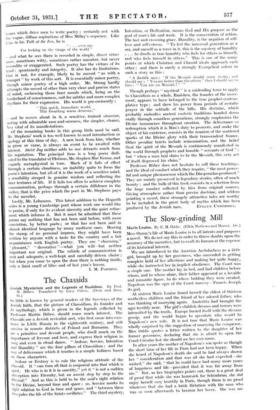The Chassids
Jewish Mysticism and the Legends of Baalshen. By Prof. M. Btiber. Translated by Lucy Cohen. (Dent and Sons. 6s.)
So little is known by general readers of the bye-ways of the Jewish faith, that the Picture of ChaSsidism, its founder and its mythology, which is given in the legends collected by Professor Martin Bfiber, should rouse much interest. The Chassids are a Jewish revivalist sect, who first came into exis- tence in Little Russia in the eighteenth century, and still survive in remote districts of Poland and Rumania. They arc a primitive and devout people, who dwell much on the importance of fervour and love, and express their religion in song and even in ritual dance. " Ardour, Service, Intention and Humility " are the four pillars of Chassidism : and the way of deliverance which it teaches is a simple holiness based on these characters.
Ardour or Ecstasy is to rule the religious attitude of the Chassid. It " can turn all that is corporeal into that which is spirit. He who is in it is in sanctity," yet it " is not a sudden absorption into Eternity, but an ascent step by step to the Eternal." And as this is held to be the soul's right relation to the Divine, beyond time and space : so, Service marks its right relation to God in time and space, and between these two poles the life of the Saints oscillates." The third mystery,
Intention, or Dedication, means God and IIis purpose as the goal of man's life and work. It is the consecration of action. The last and crowning grace, Humility, is the negation of self- love and self-esteem. " To feel the universal generation as a sea, and oneself as a wave in it, this is the mystery of humility . . . he dwells in true humility who feels for others as himself, and who feels himself in others." This is one of the many points at which Christian and Chassid ideals approach each other : and there is surely a strongly Evangelical colour in such a story as this :
" A Zaddik says : If the Messiah should come to-day, and should say : ." You are better titan the others " then I should say to him : " You are no Messiah ! " ' "
Though perhaps " mystical " is a misleading term to apply to Chassidism as a whole, Baalshen, the founder of the move- ment, appears to have belonged to the true prophet-contem- plative type ; and drew his power from periods of ecstatic prayer in the solitude of the hills. His doctrine, which probably embodies ancient esoteric traditions handed down orally through countless generations, strongly emphasizes the Divine immanence throughout creation. The deliverance or redemption which it is Man's duty to promote, and make the object of his existence, consists in the reunion of the scattered sparks of the Divine glory with their transcendent Source. Other peculiar tenets include reincarnation, and the belief that the spirit of the Messiah is continuously manifested in the world through prophets and humble " servants of God " : but " when a man laid claim to be the Messiah, this very act of itself disproved his claim."
Professor Butter does not hesitate to call these teachings, and the ideal of conduct which they require, " the most power- ful and unique phenomenon which the Diaspora has produced." They are mainly preserved in legendary stories, often of much beauty ; and the bulk of this book consists in a selection front the large number collected by hint from original sources. Giving atmosphere rather than precise doctrine, and seldom pointing a moral, these strangely attractive tales are worthy to be included in the great body of myths which has been
produced by the Jewish race. EVELYN UNDER!! ILL.






































 Previous page
Previous page